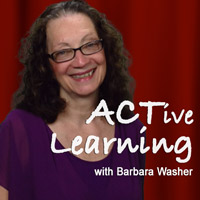| 4 , 5 | Music Phy. Education Theater Visual Art Dance |
| Theater | |
| Both Grade Level and Arts/PE Program | Alignment |
| 2 | 45 min |
| 2 | 45 min |
|
Two 45-minute sessions per classroom or one 90 minute session Length and timing of sessions easily adapts to the Art Specialist's schedule. |
|
| In-School Short Term Residency | |
| All year | In-School, |
| $10 | 0 |
| yes | In-Person |
|
Props, handouts and prompts for Sensory Awareness/Recall activities |
|
|
Chart paper or white board Paper (unlined) and Pencil for each student Agreed upon materials, supplies or copies for activities and possible art project |
|
|
Open space in classroom or multi-purpose space large enough for entire class to participate on their feet simultaneously or spread out to work in small groups Access to tables/desks/chairs for writing or drawing responses Outdoor space near the building for sensory exploration (optional) |
|
|
I can demonstrate focus and concentration by using one or more of my 5 senses (sight, hearing, touch, taste and/or smell) to notice specific details when observing a person, place or thing. I can use appropriate grade-level vocabulary to vividly describe by speaking or writing what I see, hear, smell, touch and/or taste in a sensory experience. I can use sensory recall as inspiration to design a project in Visual Arts and to add vivid details to my work. |
|
|
Observe - Recall - Create - Repeat
Drama for Art's Sake guides students to explore the world through their five senses and inspires personal expression of their experiences. Drama exercises develop tools for effectively seeing and vividly describing people, places and things. Students build concentration and observation skills, heighten sensory awareness, sharpen sensory recall, and stimulate the imagination. (See Additional Notes for sample activities) Session One - Sensory Awareness: Working "alone together" students participate in drama activities that encourage slowing down and tuning in to details in their immediate surroundings. Individually, they reflect on the experiences and then communicate their observations by drawing, writing, and/or speaking to a partner. Session Two - Sensory Recall: Students learn to place themselves "in the moment" and fully re-sense their experiences. Observing others, students discover that an audience can recognize and be drawn into the sensations of what they and their peers are re-sensing. Students finish the session by using their sensory experiences to plan/design a follow-up project selected from the curriculum by the visual arts specialist. The project is then completed in subsequent art classes. (If the project selected by the arts specialist focuses on portraits, character study exercises can be substituted for some of the sensory exercises in either session.) Alternatively, Session One can incorporate both sensory awareness and sensory recall activities. In Session Two students work individually, in partners, or in small groups to create a sketch or simple collage using color, shape, texture and/or words inspired by their sensory experiences. * See Additional Notes for applying the residency to other art forms (music/dance/theatre) or for creating extended projects that also incorporate language arts. |
|
|
Sample Activities could include:
Sensory Awareness - Through a Windowpane, Listening to the Environment, Discovering an Object or Trust Walk. Sensory Recall - Seeing a Sport, What Am I Listening To? and What's That Food? The skills developed in Drama for Art's Sake not only support creating various Visual Arts projects, but can also appy to building Dance/Movement sequences, composing/arranging Music/Sound, or bringing added reality to Drama scenes. Though the database format does not provide space for including Arts standards for each discipline, appropriate ones can be selected. This program also works well as an arts/language arts/theatre collaboration in which a specific sensory experience becomes the inspiration for writing poems or descriptive paragraphs and creating a related art/music/dance/theatre project. *All ACTive Learning Through Drama programs have been developed and implemented by a professional theatre educator in collaboration with classroom teachers and arts specialists. |
|
|
1-3 are welcome to assist in classroom, if desired by the Art Teacher |
|
Grade 4 |
||||
|
||||
Grade 5 |
||||
|

